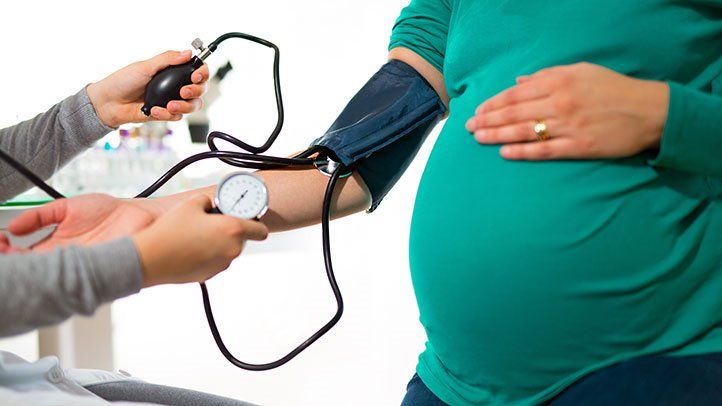
Hypertension in pregnancy is a serious medical condition that can have significant implications for both the mother and the baby. The exact cause of hypertension during pregnancy is unknown. There are various forms of hypertensive disorders that can occur during pregnancy. Having high blood pressure (hypertension) during pregnancy results in less blood flow to the placenta.
If the placenta doesn’t get enough blood, the foetus might receive less oxygen and fewer nutrients. This can lead to slow growth (intrauterine growth restriction), low birth weight or premature birth. Babies born early can have breathing problems, increased risk of infection and other complications.
Monitoring your blood pressure is an important part of prenatal care. If you have chronic hypertension, your health care provider will consider these categories for blood pressure measurements:
Elevated blood pressure. Elevated blood pressure is a systolic pressure ranging from 120 to 129 millimeters of mercury (mm Hg) and a diastolic pressure below 80 mm Hg. Elevated blood pressure tends to get worse over time unless steps are taken to control it.
Stage 1 hypertension. Stage 1 hypertension is a systolic pressure ranging from 130 to 139 mm Hg or a diastolic pressure ranging from 80 to 89 mm Hg.
Stage 2 hypertension. This stage is more severe. It’s a systolic pressure of 140 mm Hg or higher or a diastolic pressure of 90 mm Hg or higher.
After 20 weeks of pregnancy, blood pressure that’s higher than 140/90 mm Hg without any other organ damage is considered to be gestational hypertension. Blood pressure needs to be taken and documented on two or more occasions, at least four hours apart.
Let’s take a look at the types of hypertensions in pregnancy:
Chronic Hypertension
Chronic hypertension means having high blood pressure* before you get pregnant or before 20 weeks of pregnancy.1 Women who have chronic hypertension can also get preeclampsia in the second or third trimester of pregnancy.1
Gestational Hypertension
This condition happens when you only have high blood pressure during pregnancy and do not have protein in your urine or other heart or kidney problems. It is typically diagnosed after 20 weeks of pregnancy or close to delivery. Gestational hypertension usually goes away after you give birth. However, some women with gestational hypertension have a higher risk of developing chronic hypertension in the future.
Preeclampsia/Eclampsia
Preeclampsia happens when a woman who previously had normal blood pressure suddenly develops high blood pressure and protein in her urine or other problems after 20 weeks of pregnancy. Women who have chronic hypertension can also get preeclampsia.
Symptoms of preeclampsia include:
- A headache that will not go away
- Changes in vision, including blurry vision, seeing spots, or having changes in eyesight
- Pain in the upper stomach area
- Nausea or vomiting
- Swelling of the face or hands
- Sudden weight gain
- Trouble breathing
Some women have no symptoms of preeclampsia, which is why it is important to visit your health care team regularly, especially during pregnancy.
You are more at risk for preeclampsia if:
- This is the first time you have given birth.
- You had preeclampsia during a previous pregnancy.
- You have chronic (long-term) high blood pressure, chronic kidney disease, or both.
- You have a history of thrombophilia (a condition that increases risk of blood clots).
- You are pregnant with multiple babies (such as twins or triplets).
- You became pregnant using in vitro fertilization.
- You have a family history of preeclampsia.
- You have type 1 or type 2 diabetes.
- You have obesity.
- You have lupus (an autoimmune disease).
- You are older than 40.
In rare cases, preeclampsia can happen after you have given birth. This is a serious medical condition known as postpartum preeclampsia. It can happen in women without any history of preeclampsia during pregnancy. The symptoms for postpartum preeclampsia are similar to the symptoms of preeclampsia. Postpartum preeclampsia is typically diagnosed within 48 hours after delivery but can happen up to 6 weeks later.
What can I do to reduce the risk of complications?
- Taking good care of yourself is the best way to take care of your baby. For example:
- Keep your prenatal appointments. Visit your health care provider on a regular basis throughout your pregnancy.
- Take your blood pressure medication and low-dose daily aspirin as prescribed. Your health care provider will prescribe the safest medication at the most appropriate dose.
- Stay active. Follow your health care provider’s recommendations for physical activity.
- Eat a healthy diet. Ask to speak with a dietitian if you need help planning meals.
- Know what’s off-limits. Avoid smoking, alcohol and illegal drugs. Talk to your health care provider before taking nonprescription medications.
watch full video